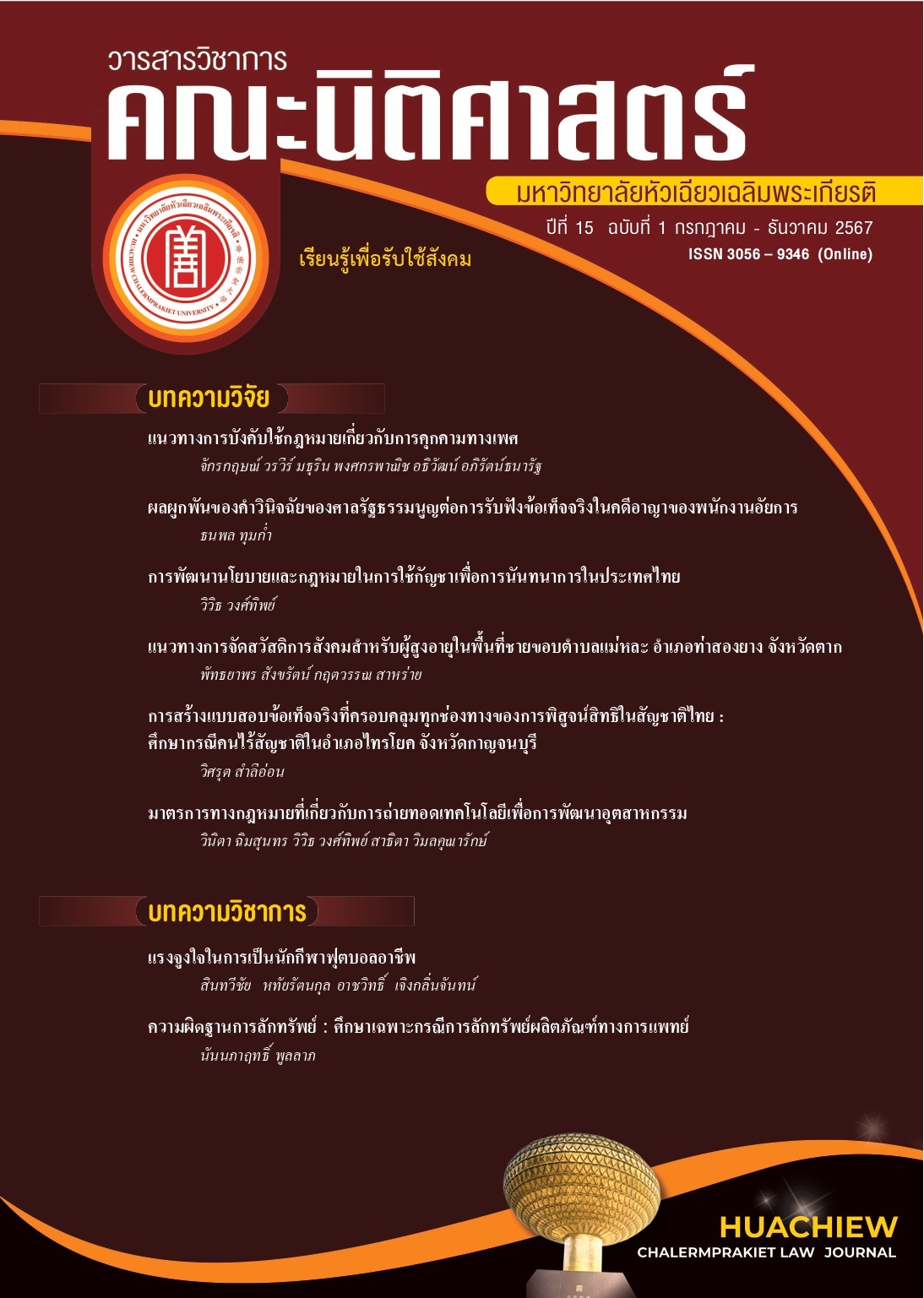Legal Measures Concerning Technology Transfer for Industrial Development
Keywords:
Technology Transfer, Foreign Investment, Intellectual Property Protection, Antimonopoly, Economic Liberalization, Industrial DevelopmentAbstract
Thailand adopts economic liberalization in hopes of receiving technology through foreign investment and technology transactions. Nevertheless, Thai personnel do not sufficiently benefit from technology transfer, comparing to the benefits that foreigners reap from Thailand’s resources. Furthermore, Thailand still lacks a concrete regulatory framework for technology transfer.
China, Japan and Vietnam are under binding commitments as World Trade Organization’s members, but these three countries can set clear regulatory frameworks for technology transfer. Since China and Japan put the antimonopoly rules in the field of intellectual property into effect, which prevent the abuse of intellectual property rights, and lead to the balance of intellectual property protection and fair technology transfer. While Vietnam collects and systematically organizes the regulations concerning technology transfer into a single law.
The researcher proposes that the antimonopoly rules in the field of intellectual property and regulations concerning technology transfer should be codified into a model law, in a manner consistent with World Trade Organization’s regulations. This clear regulatory framework will eventually result in the fair transfer of technology and industrial development.
References
โกศล ฉันธิกุล และสมพงษ์ วนาภา, “การถ่ายทอดเทคโนโลยีระหว่างประเทศ”, ใน สาขาวิชานิติศาสตร์ มหาวิทยาลัยสุโขทัยธรรมาธิราช, กฎหมายธุรกิจระหว่างประเทศ เล่มที่ 2 (นนทบุรี: สำนักพิมพ์มหาวิทยาลัยสุโขทัยธรรมาธิราช, 2528).
สุธี ประศาสน์เศรษฐ, “วิวัฒนาการระบบเศรษฐกิจไทยในรอบ 200 ปี” (2556) 1:1 วารสารเศรษฐศาสตร์การเมือง.
หลินอี้ฟาน, แนวทางที่เหมาะสมสำหรับการกำหนดกฎเกณฑ์ในการประกอบธุรกิจของคนต่างด้าว: กรณีศึกษาประเทศสาธารณรัฐประชาชนจีน (ปริญญาศิลปศาสตรมหาบัณฑิต, คณะนิติศาสตร์ จุฬาลงกรณ์มหาวิทยาลัย, 2563).
Cantwell, John and Zhang,Yanli, “The Co-Evolution of International Business Connections and Domestic Technological Capabilities: Lessons from the Japanese Catch-Up Experience” (2009) 18:2, Transnational Corporations.
Carrier, Micheal A., From Matter and Introduction to: Intellectual Property and Competition (19 July 2024) Social Science Research Network <https://papers.ssrn.com/sol3/papers.cfm?abstract_id=1944946>.
Chistopher Heath, “Anti-Competitive Clauses in Know-How Agreements FTC Decision of October 13,1995” 1996:2 Zetschrift Fur Japanisches Recht.
Jiang, Kun, Keller, Wolfgang, Qiu, Larry D. and Ridley, William, International Joint Ventures and Internal vs. External Technology Transfer: Evidence from China (Massachusetts: National Bureau of Economic Research, 2018).
Ohno, Kenichi, The History of Japanese Economic Development: Origins of Private Dynamism and Policy Competence, (New York: Routledge, 2018).
Ohno, Kenichi, The Economic Development of Japan: The Path Traveled by Japan as a Developing Country (Tokyo: National Graduate Institute for Policy Studies, 2005).
U.S. Congress, Office of Technology Assessment, Competing Economies: America, Europe, and the Pacific Rim (Washington DC: U.S. Government Printing Office, 1991).
Hiroki Saito, “Laws Affecting Ip Licensing-Japan” (2023) 58:2 LES Nouvelles.
Tung, Nguyen Thang and Long, Bui The, “Promoting Technology Transfer and Innovation for Development of Industrial Clusters: Theoretical Framework and Policy Implications for Vietnam” (2020) 9:3 Journal of Science and Technology Policies and Management,
United Nations Conference on Trade and Development, World Investment Report 2018: Investment and New Industrial Policies (Geneva: United Nations Publication, 2018).
Wakui, Masako, “Intellectual Property and Antitrust in Japan”. In Blair, Roger D., Sokol, D. Daniel, The Cambridge Handbook of Antitrust, Intellectual Property, and High Tech (Cambridge: Cambridge University Press, 2017).
World Intellectual Property Organization, Intellectual Property and Technology Transfer (19 July 2024) World Intellectual Property Organization <https://www.wipo.int/web/technology-transfer>.
Yang, Limei, Assessing the Impacts of China’s Accession to the WTO (master’s degree in Internationalization: Economic, Business and Legal-Political Aspects, Faculty of Economics and Business, University of Barcelona, 2023).
Downloads
Published
How to Cite
Issue
Section
License
Copyright (c) 2024 Huachiew Chalermprakiet Law Journal

This work is licensed under a Creative Commons Attribution-NonCommercial-NoDerivatives 4.0 International License.
บทความหรือข้อความคิดเห็นใด ๆ ที่ปรากฏในวารสารฉบับนี้เป็นวรรณกรรมของผู้เขียนโดยเฉพาะ คณะนิติศาสตร์มหาวิทยาลัยหัวเฉียวเฉลิมพระเกียรติ และกองบรรณาธิการไม่มีส่วนรับผิดชอบหรือไม่จำเป็นต้องเห็นด้วยกับข้อคิดเห็นนั้น แต่ประการใด








